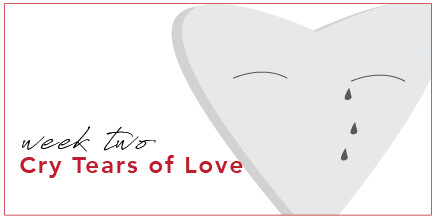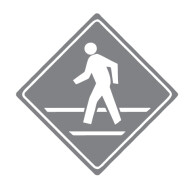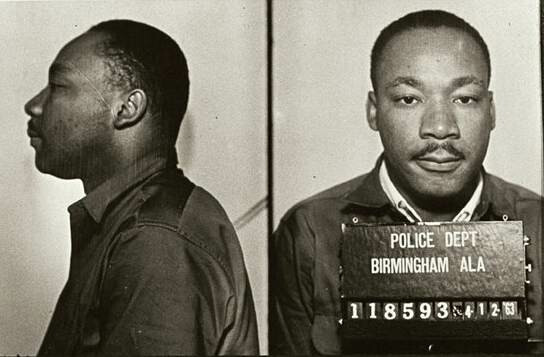Cry Tears of Love
Week Two: Feb. 18-24

- Letter from a Birmingham Jail, PDF, April 16, 1963
- Anna Deavere Smith recites MLK’s Letter from a Birmingham Jail
Isaiah 40:1-5
Comfort, O comfort my people,
says your God.
Speak tenderly to Jerusalem,
and cry to her
that she has served her term,
that her penalty is paid,
that she has received from the Lord’s hand
double for all her sins.
A voice cries out:
“In the wilderness prepare the way of the Lord,
make straight in the desert a highway for our God.
Every valley shall be lifted up,
and every mountain and hill be made low;
the uneven ground shall become level,
and the rough places a plain.
Then the glory of the Lord shall be revealed,
and all people shall see it together,
for the mouth of the Lord has spoken.”
By the Rev. Louis Shockley, Retired Baltimore-Washington Conference Elder
On April 16, 1963, Martin Luther King Jr. responded to criticism from eight prominent, liberal, white Alabama clergy. Those eight had published an open letter to King calling on him to allow the battle of integration to continue in the local and federal
On April 12, 1963, King was arrested for violating a judge’s order to cease demonstrations in Birmingham, Ala. While in jail, he sat down and wrote a response to the criticism that had been published in a local newspaper. First, he thanked the pastors for their concern and assured them that he would not have been in the city had he not received an invitation from the African American representatives of the community.
Then he offered these words: “I’m in Birmingham because injustice is here. Just as prophets of the eighth century left little villages and carried their ‘thus saith the Lord’ far beyond
King goes on to say that there are three basic steps in any campaign of resistance: 1) collection of facts to determine whether injustices are alive; 2) negotiation; and 3) self-purification for direct action.
In this 21st century, we find ourselves faced with many issues of injustice and social concerns for all who want the voice of God to be the dominant voice in our lives. But I think the most important lesson to be learned from King’s letter is centered around the issue of any actions taken breaking the laws of this country. In King’s own words, “You express a great deal of anxiety over our willingness to break laws. This is certainly a legitimate concern… One may well ask: how can you advocate breaking some laws and obeying others? The answer is found in the fact that there are two types of law: there are just and there are unjust laws. I would agree with St. Augustine that an unjust law is no law at all. How does one determine when a law is just or unjust? A just law is a man-made code that squares with the moral law or law of God. An unjust law is a code that is out of harmony with the moral law. … Any law that uplifts human personality is just. Any law that degrades human personality is unjust.”
My good sisters and brothers of the faith, the letter from the Birmingham Jail is calling us to action today. What will be our response?
Crosswalk
Breathe
Love in action…changes things.
As you breathe in, say or think: “Love in action.” Experience God’s love in action in your breath and body. As you exhale, say or think: “changes things.” Continue this breath prayer and on the exhale, name what needs changing (for you, your family, your congregation, your neighborhood, our denomination, our country, our world). Do this each day for at least 3 minutes. Notice how the Spirit ministers to and
Reflect
- What thoughts from Rev. Shockley’s devotion resonate most with you? Why?
- By what standard do you judge whether a law is “just” or “unjust”?
- In your daily living, how are you called to “prepare the way of the Lord?”
- In his letter from a Birmingham jail, King penned several passages that have inspired people over the decades: “Injustice anywhere is a threat to justice everywhere. … Freedom is never voluntarily given by the oppressor, it must be demanded by the oppressed. … Justice too long delayed is justice denied.” What role does the idea of justice play in your daily life? How are ideas about justice lived out in your faith community? In what way will you take a stand for justice this Lent?
- In this letter, King confesses: “I have reached the regrettable conclusion that the Negro’s great stumbling block in the stride toward freedom is not the White Citizens Councilor or the Ku Klux Klanner, but the white moderate who is more devoted to order than to justice, who prefers a negative peace, which is the absence of tension, to the positive peace, which is the presence of justice…” In what areas of your life and ministry are you willing to settle for an absence of tension, rather than the presence of justice? How often
to you believe church leaders continue this practice? What might be done, in your opinion, to address this spirit of compromise? - King calls on people of faith to not be thermometers, recording the ideas and principles of popular opinion, but to be thermostats that transform the mores of society. What is one way you could be a thermostat this Lent?
Create
King’s letter was written in response to a statement of concern issued by eight religious leaders who urged caution when dealing with law enforcement. If you were to write a Lenten letter to the religious leaders of your community, what might it say? Share your letters on our Facebook Group.
Lead
Great leaders create and operate within
Navigate
Identify your plan for bringing people with you to the destination you chose last week. Think about friends, family, faith communities, and other community organizations that are partners or could be partners in an ongoing effort to bring
Pray
God



